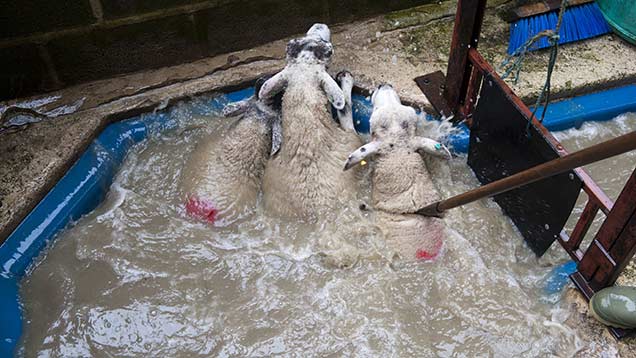‘Destroyed’ OP sheep dip report unearthed
 ©FLPA/Wayne Hutchinson/Rex
©FLPA/Wayne Hutchinson/Rex A government agency report examining the impact of organophosphate sheep dip on human health has been unearthed – just weeks after the Health and Safety Executive (HSE) said it had been destroyed.
The 24-year-old document details a 1990 survey of farmers and farmworkers who were legally required to use organophosphate (OP) chemicals until dipping against scab ceased to be compulsory in 1992. Many farmers blame the chemicals for causing them ill health.
See also: Crucial sheep dip document ‘destroyed’
After submitting a Freedom of Information request for the HSE to release the report, Lancashire farmer Tom Rigby was initially told that the document had been destroyed. But the HSE has now unearthed a copy of the report in a previously uncatalogued file in one of its local offices.
“Repeated absorption of small doses [of OPs] have a cumulative effect and can result in progressive inhibition of nervous system cholinesterase,” says the document. In addition to the acute affects, other signs and symptoms can appear one to five weeks after acute exposure, it adds.
“Reported symptoms include leg cramps, numbness and paraethesiae, followed by progressive leg weakness,” says the internal report, which was distributed to HSE staff in May 1991.
Mr Rigby, of the Sheep Dip Sufferers Support Group, is campaigning for better treatment of OP sufferers. He hopes the issue of OP sheep dip will be the subject of a parliamentary adjournment debate before the general election.
Mr Rigby said: “It is now clear that the “cumulative effect of OPs” and “organophosphorus-induced delayed polyneuropathy” were both officially recognised in 1990, even if it seems they have been denied ever since.”
He added: “The report also highlights the potential health-damaging effects of phenols and impurities which we believe did contribute to the harm caused but both have been ignored in all research since.”
The HSE has apologised to Mr Rigby for mistakenly telling him the document had been destroyed.
